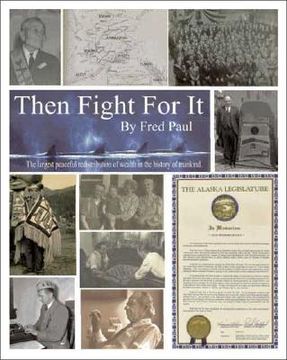Then Fight For It!: The Largest Peaceful Redistribution of Wealth in the History of Mankind and the Creation of the North Slope Borough (en Inglés)
Reseña del libro "Then Fight For It!: The Largest Peaceful Redistribution of Wealth in the History of Mankind and the Creation of the North Slope Borough (en Inglés)"
Hoonah is an ancient Tlingit village nestled within a harbor on the south shore of Icy Strait. The Hoonah Tlingit have always enjoyed a well earned reputation of both vigor and rigor in domination that fierce country through the centuries. A prime example of the hardy Hoonah Tlingit is George Dalton and his family. Back in the spring of 1921 George's father had taken his family, as he did every year, to plant their garden on one of the Native islands in the middle of Icy Strait. Here they grew potatoes fertilized by seaweed they piled onto the cultivated land after each harvest. That island had belonged to the Dalton family for centuries. As they began unloading gear onto their island, happy to be at their gardening home during the bright promise of spring, a shot rang out. "Somebody's hunting." they said to each other. "Who could it be?" How wrong they were! An angry white man had fired a warning shot, and now threatened them with more. "Get the hell off my island," he shouted. "I got permits from the Forest Service and the Land Office to be here." The Daltons left. Fox farming had become a profitable business. A person had only to turn some breeding foxes loose on a small island. Then he had little do do but feed them free Icy Strait salmon until harvest time in the autumn. At Hoonah, the Daltons learned that fox farmers had ordered many other Tlingit families away from islands they had always used for gardens. By the time the elections came round in 1924, feeling between Natives and whites on this subject ran high. The White Man's Party platform said, "Passage of legislation by Congress giving the fox farmers title to lands occupied and improved by them, thus ending definitely a possibility that the Indian leaders might succeed in driving ranchers from their island establishments which Paul and his supporters claim belong to the Indians." Delegates to the ANB's annual convention in 1925 discussed the subject from every angle. During the activities Peter Simpson, a Tsimshian Native, took my father aside to talk seriously about the fox farmers. "Willie," he said, opening a conversation I heard my father recount many times, "Tell me one thing, Who owns this land?" My father always hesitated before answering in a low voice. "We do." The old man looked deep into my father's eyes. "Then fight for it," he commanded. "Then fight for it." My father told that story in exactly these words again and again. In that moment my father felt the old man had confided to him a challenge, a mission, a sacred trust. Thus was born the Alaska Native Land claims movements, a birth in which the fox breeders of Icy Strait may be said to have served as midwives. Nothing had influenced Native opinion in the way the fox farmer's summary eviction of Native families from their island gardens now galvanized and united the Natives of Southeast Alaska.

